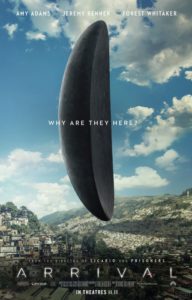Arrival (2016) comes to us as the latest in a string of science-fiction movies notable for the way they build upon philosophical issues with the tools their genre gives them. However, while Arrival stands on the same podium as its peers, it does so only in their shadows.
Whoever said “comparisons are odious” clearly was not a critic, and was never faced with a line of films like Gravity (2013), Interstellar (2014), Ex Machina (2015), and Arrival. In this day and age, the film world is a seething pool of piranhas, each trying to get a small morsel of originality, and to not compare them to each other would be to not acknowledge that they are all eating from the same carcass.
That said, Arrival is a good film in many respects. For one, it’s a movie about aliens that features remarkably little violence. The aliens themselves, and their relationship with humans, are fascinating (even if their purpose on Earth is vague), and Amy Adams as linguist Louise Banks is a vision of suppressed emotion.
Furthermore, the film attempts to be more and to say more than the average sci-fi film. It attempts to comment (topically) on a single-but-divided human race. It has interesting insights into language and its relationship to personality (admittedly, nothing you couldn’t read in a first-year psychology textbook).
Most importantly, though, Arrival tried, and it didn’t fail by much. I have respect for any film—especially a blockbuster—that tries to do more than it’s asked to do, that tries to give more to the audience than adrenaline and dopamine, that tries to challenge them intellectually.
However, when compared to a film such as Interstellar, Arrival’s shortcoming can be seen clearly. Comparisons between the two blockbusters make Interstellar’s mastery of film narration become apparent. It’s a film that tackles the most difficult questions out there—who are we as a species? What is our species worth? What in the heck is time?—but keeps the audience engaged at all times. It’s a film that isn’t scared of experimentation, and director Christopher Nolan, known for his awe-inspiring visuals, is able to show us things rather than merely talk about them.
In many ways, the concepts dealt with in Arrival are too abstract for its conventional visual approach. Interstellar matched “wow” ideas with “wow” visuals—Arrival often seems too timid.
In the end, though, this is because Arrival is not an all-out space opera like Interstellar was. In many ways, it’s a family drama masquerading as a sci-fi film, and a touching one at that.
But the result of this combination is that the audience is prepared to be “wowed”—ready for something epiphanic—and instead is left with Louise’s personal drama—drama that would be extremely moving were we not ready for something more thematically interstellar.
Having said that, Arrival is superior to any film in the theatre today (admittedly not a stupendous achievement when up against Inferno, The Accountant, and Trolls), and it’s a film that asks more of you than your eyeballs: you must engage with your brain as well.
Most of all, though, this is a film that swings for the fences, which is an admirable trait regardless of ability.


Had to fathom how anyone could think Interstellar worked on some level that this film didn’t. Having seen both, I came away with the opposite impression. Arrival is everything Interstellar tried to be, but wasn’t.